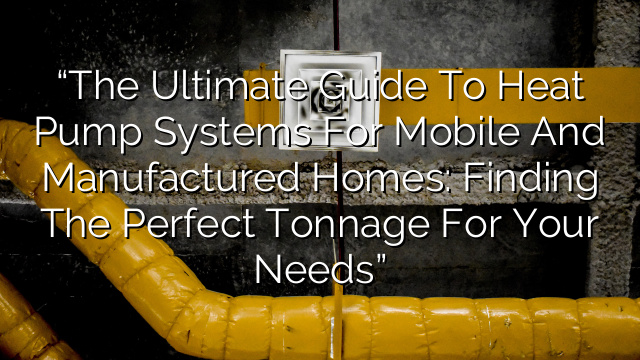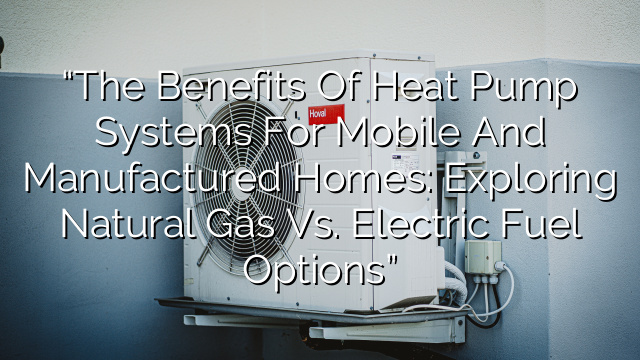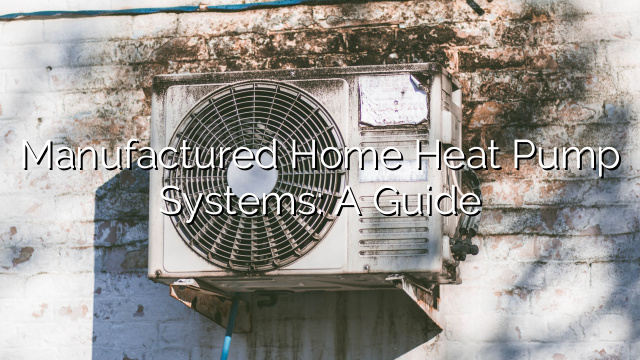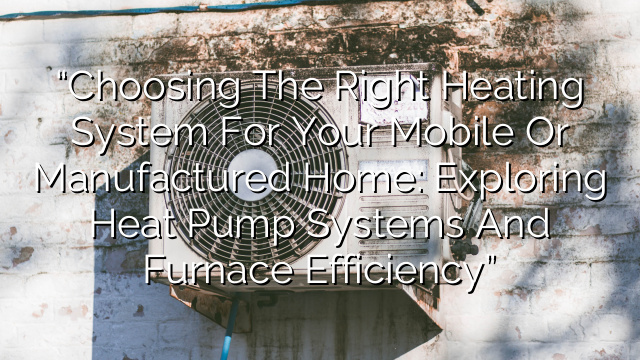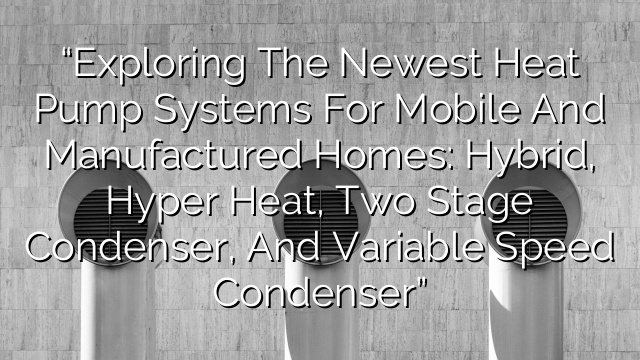Introduction
When it comes to heating and cooling your mobile or manufactured home, a heat pump system is a popular and energy-efficient option. But with so many different tonnage options available, it can be overwhelming to determine the right size for your home. In this ultimate guide, we will break down everything you need to know about heat pump systems for mobile and manufactured homes, including system tonnage and how to choose the perfect size for your needs.
What is a Heat Pump System?
A heat pump system is a type of HVAC system that provides both heating and cooling to your home. Unlike a traditional furnace or air conditioning unit, which generate heat or cold air, a heat pump transfers heat between the indoors and outdoors depending on the season. This transfer of heat is done through the use of refrigerant and a compressor, resulting in efficient and cost-effective temperature control.
Importance of Choosing the Right Tonnage
The tonnage of a heat pump system refers to its cooling capacity. It determines how much heat the system can remove from your home in a given period of time. Choosing the right tonnage is important to ensure that your heat pump can effectively cool your home during the summer months and provide adequate heating during the winter months. A system that is too small for your home may struggle to maintain the desired temperature, while a system that is too large may cycle on and off frequently, resulting in wasted energy and reduced comfort.
Determining the Right Tonnage for Your Home
When determining the right tonnage for your mobile or manufactured home, there are several factors to consider:
- Size of the home: The square footage of your home is one of the main factors in determining the right tonnage. Generally, the larger the square footage, the higher the tonnage required. However, other factors such as ceiling height and insulation levels can also impact the tonnage needed.
- Climate: The climate you live in plays a role in determining the tonnage needed. Homes located in warmer climates will require higher tonnage to provide sufficient cooling, while homes in colder climates will require higher tonnage for heating.
- Number of windows and doors: The number of windows and doors in your home can affect the tonnage needed. Windows and doors can let in heat during the summer and cold air during the winter, so homes with many windows and doors may require higher tonnage to compensate.
- Insulation levels: The insulation levels in your home can impact the tonnage needed. Homes with better insulation will require less tonnage, as the insulation helps to retain the desired temperature.
- Usage patterns: Consider how you use your home. If you have a larger family or regularly entertain guests, you may require higher tonnage to accommodate the increased occupancy and heat load.
Choosing the Right Tonnage
Once you have considered the above factors, you can use the following guidelines to choose the right tonnage for your mobile or manufactured home:
- 2 Ton: Ideal for smaller homes or areas with mild climate conditions.
- 2.5 Ton: Suitable for small to medium-sized homes in moderate climate conditions.
- 3 Ton: Suitable for medium-sized homes in most climate conditions.
- 3.5 Ton: Suitable for larger homes in mild to moderate climate conditions.
- 4 Ton: Suitable for larger homes or areas with high heat loads, such as homes with poor insulation or many windows and doors.
- 5 Ton: Suitable for very large homes or areas with extreme heat loads, such as homes in hot and humid climates.
It is important to note that these tonnage recommendations are general guidelines. Factors such as unique home design, location, and personal preference may influence the tonnage needed. It is recommended to consult with a professional HVAC technician to determine the ideal tonnage for your specific home.
FAQs
Q: Can I install a heat pump system in my mobile or manufactured home?
A: Yes, heat pump systems are a popular choice for mobile and manufactured homes due to their energy efficiency and versatility.
Q: What is the lifespan of a heat pump system?
A: On average, a well-maintained heat pump system can last between 12 and 15 years. Regular maintenance and proper usage can help extend the lifespan of your system.
Q: Can I install a heat pump system myself?
A: It is recommended to hire a professional HVAC technician to install your heat pump system. They have the necessary knowledge and expertise to ensure proper installation and optimal performance.
Q: How often should I replace my heat pump system?
A: If your heat pump system is old or constantly experiencing issues, it may be time to consider replacing it. The average lifespan of a heat pump system is 12 to 15 years, but factors such as usage, maintenance, and climate can impact its longevity.
Q: Are heat pump systems more energy-efficient than traditional HVAC systems?
A: Yes, heat pump systems are generally more energy-efficient compared to traditional HVAC systems. They transfer heat rather than generate it, resulting in lower energy consumption and reduced utility costs.
Q: Are heat pump systems eligible for rebates or incentives?
A: In many cases, heat pump systems are eligible for rebates or incentives offered by utility companies, local or state governments, or federal programs. It is recommended to check with your local authorities or utility company to see if you qualify for any incentives.
Conclusion
When it comes to heating and cooling your mobile or manufactured home, choosing the right tonnage for your heat pump system is essential. By considering factors such as the size of your home, climate, and insulation, you can determine the ideal tonnage to ensure optimal comfort and energy efficiency. If you are unsure about the tonnage needed for your home, it is always best to consult with a professional HVAC technician. With the right tonnage, you can enjoy the benefits of a reliable and efficient heat pump system for years to come.

